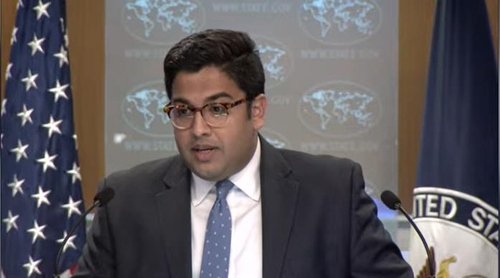Accusations that US provoked N. Korean missile tests 'baloney': State Dept.
By YonhapPublished : Oct. 18, 2022 - 09:13

WASHINGTON -- A spokesperson for the US state department on Monday dismissed a claim made by North Korea and its friendly nations that the North's recent missile tests had been provoked by the United States, calling it "baloney."
Vedant Patel, principal deputy spokesperson for the department, also reiterated that the North's recent missile tests and other provocative actions are "condemnable."
"As it relates to the DPRK, I think you saw last week when there was a UN Security Council hearing on this. You saw the PRC, Russia and other countries parrot this false claim that US provocations were the origination of these ballistic missile launchers or anything like that," the spokesperson said, referring to North Korea and China by their official names -- the Democratic People's Republic of Korea and the People's Republic of China."
"That's baloney and absolutely not the case," he added.
North Korea staged eight rounds of ballistic missile tests in less than three weeks from late last month.
Pyongyang blamed joint military exercises of South Korea and the US for causing it to conduct such tests in response.
China and Russia, both veto power-wielding permanent members of the Security Council, repeated the North Korean claim at the UN Security Council meeting, effectively blocking US-led efforts to impose additional sanctions on North Korea.
"You saw me speak to this quite clearly last week that the recent ballistic missile launches the other kinds of aggravation and provocation that we're seeing are condemnable," said Patel.
"These specific ballistic missile launches are in clear violation of multiple UN Security Council resolutions, and beyond the violation of resolutions, these kinds of activities, they pose a very serious threat to the region and to the world more broadly," he added.
Secretary of State Antony Blinken said the North may be trying to draw the US' attention, as it always has.
"They think, from the leadership's perspective in North Korea, part of what we are seeing is (it) doesn't like to be ignored," Blinken said when asked about North Korea in a special conversation with former Secretary of State Condoleezza Rice on the importance of technology, diplomacy and national security in Stanford, California.
"And so when the world is focused elsewhere, this is a reminder that we (North Korea) are still here. We are still a problem. You have to deal with it," he added.
The top US diplomat noted the joint military exercises of South Korea and the US could not have been the reason for North Korea's missile provocations, saying they have been held for years.
"Over the last months, going back about a year, we have significantly increased our own work with our allies and partners in the region -- South Korea, Japan -- both on a bilateral basis where we, for example, renewed exercises that we have had for years," said Blinken.
He argued the real reason for the North's recent missile provocations may instead have been the growing cooperation between the US, South Korea and Japan.
"We brought them back -- military exercises -- to make sure that we can defend and hopefully deter any kind of North Korean aggression, as well as work that's being done now, in ways that it hadn't been in recent years among the United States, Japan, Korea together, which has lots of benefits including bringing Korea and Japan closer together," the secretary said.
"I think that Kim Jong-un saw that and didn't like it. And it's a response to that," he added.
Patel said the US will continue to take necessary actions, together with its allies.
"So what the United States is going to continue to do is we are going to continue to stay engaged with our allies, the Republic of Korea and Japan. We are going to continue to have diplomatic engagements with them and take appropriate actions as necessary," he said. (Yonhap)



![[Exclusive] Korean military set to ban iPhones over 'security' concerns](http://res.heraldm.com/phpwas/restmb_idxmake.php?idx=644&simg=/content/image/2024/04/23/20240423050599_0.jpg&u=20240423183955)




![[Herald Interview] 'Amid aging population, Korea to invite more young professionals from overseas'](http://res.heraldm.com/phpwas/restmb_idxmake.php?idx=644&simg=/content/image/2024/04/24/20240424050844_0.jpg&u=20240424200058)

![[Pressure points] Leggings in public: Fashion statement or social faux pas?](http://res.heraldm.com/phpwas/restmb_idxmake.php?idx=644&simg=/content/image/2024/04/23/20240423050669_0.jpg&u=)









